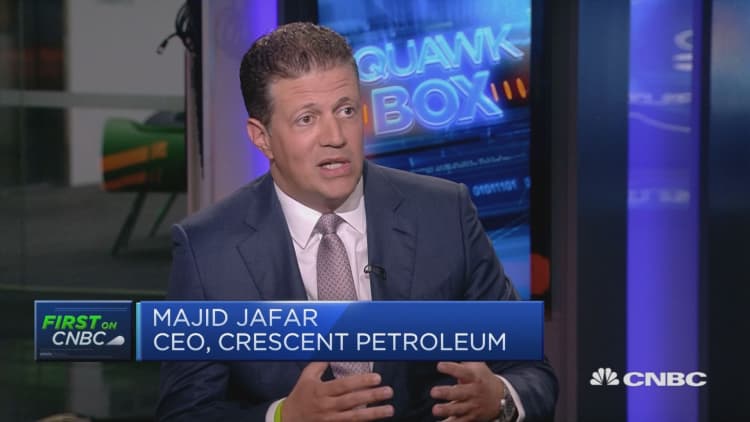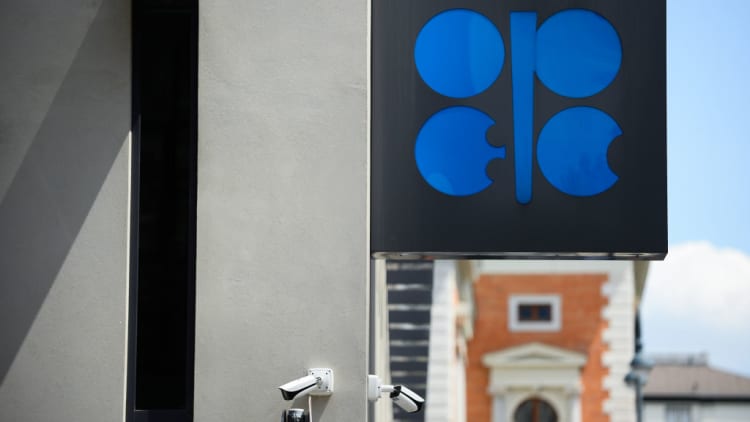ABU DHABI — Iraq will immediately comply with OPEC production cuts after months of overproduction, its oil minister told CNBC on Tuesday.
The second-largest crude producer in the 14-member organization is often labeled OPEC's 'problem child' for chronically overproducing even as the group tries to curb output during a time of low oil prices.
In August, Baghdad reported its highest oil production on record at 4.6 million barrels per day (bpd), a volume that has increased steadily over the past few years despite nearly two decades of war and a bloody three-year battle to drive out the so-called Islamic State (IS).
"We are trying to adhere to our commitment that we have agreed on the third of December last year with our colleagues in OPEC and outside OPEC, but with difficulties, of course," Iraqi Oil Minister Thamer Ghadhban told CNBC at the 24th annual World Energy Congress in Abu Dhabi.
Among those difficulties are disputes with the semi-autonomous Kurdish Regional Government (KRG), which holds roughly 30% of Iraq's proven oil reserves, as well as the country's high domestic power demand during Iraq's hot summer months.
"Right away from now, from this month, we will go back to normal and... crude oil for power generation will be down to about 80,000, 85,000 (bpd) instead of 205,000," the minister said.
In recent weeks, Iraq has had to refine some 200,000 bpd for local power generation, Ghadhban explained, compared to the domestic demand in winter of about 75,000 bpd. This production came in addition to the increase in production and export capacity from the KRG, he said.

"That is why our numbers look higher or inflated," Ghadhban added. "So this, and also I ordered the deduction in the refining capacity, and there would be a drop in our exports."
The Arab country of 38 million, home to 12% of the world's proven oil reserves, has seen improved output, primarily from its southern oilfields thanks to partnerships with international oil companies. Its super giant Majnoon field in Basra saw production double to 200,000 bpd in June after having been curtailed at the beginning of the year due to its OPEC quota.
Iraq is on track to produce nearly six million bpd by 2030, according to an April report by the International Energy Agency, which would make it the third biggest oil supplier in the world.
Iraq and OPEC: a complicated relationship
Iraq's highest-ever production count has contributed to what in August was OPEC's first monthly output rise of the year, throwing a wrench into the group's plans to limit global oil supply and boost crude prices.
The country's output five years ago was 2.96 million bpd, and between the 2003 U.S. invasion of Iraq and 2010 it veered between less than half a million barrels per day to barely touching 2.5 million. So after more than 15 years of conflict and a dire need to rebuild, Iraq's government has hailed this growth as a success.
Many in the country feel that it deserves to overproduce to bring in the revenues needed to rebuild much its damaged and ageing infrastructure. Almost 90% of Iraq's government revenue comes from oil. But after facing multiple budget deficits in recent years due to unstable market conditions, it also needs to see prices stabilized, which OPEC aims to achieve through supply cuts.
"We have at present production capacity just exceeding five million barrels per day, the country as a whole, including the capacity within the federal region of Kurdistan," Ghadhban said. "But we are not producing that capacity... presently we are trying our best to keep our production level close to what we have agreed on with OPEC."
Iraq actively sought an exemption from OPEC's cutting program in November 2016 because of its revenue needs amid severe economic and security challenges. But it ended up bearing the second-largest cutting requirement in the group, struggling to comply ever since. Iraq was later added to the Joint Ministerial Monitoring Committee (JMMC), OPEC's nine-member monitoring committee, but that so far hasn't helped ensure compliance.
Saudi Crown Prince, and de facto leader of OPEC, Mohammed bin Salman held a phone call with Iraqi Prime Minister Adel Abdul Mahdi last week to emphasize the importance of cooperation to balance oil markets, Saudi state media reported on Thursday.
OPEC in early July announced its decision, along with several non-OPEC producers including Russia, to curb output into 2020 in an effort to boost prices amid a weakening demand outlook and rising shale production in the United States. Saudi Arabia has taken on the lion's share of the cuts, pumping less than 10 million barrels per day of crude, significantly below its OPEC production target.



